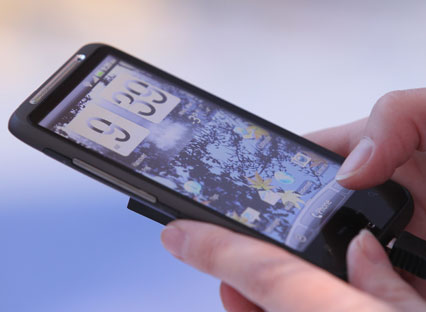Stagefright: major Android security flaw affects millions
Hackers can use the vulnerability to read text messages, look at photos and spy on Android owners through their phone's camera

A free daily email with the biggest news stories of the day – and the best features from TheWeek.com
You are now subscribed
Your newsletter sign-up was successful
Android users have been warned that a major security flaw, nicknamed Stagefright, allows hackers to access smartphones simply by sending a malicious text message.
The flaw is thought to affect the vast majority of Android users and means hackers can read messages, look at private photos or even spy on users through a smartphone's camera and microphone.
According to Joshua Drake, the researcher who found the flaw, hackers can exploit the vulnerability to take control of almost any Android phone simply by sending an infected video via MMS (multimedia messaging service).
The Week
Escape your echo chamber. Get the facts behind the news, plus analysis from multiple perspectives.

Sign up for The Week's Free Newsletters
From our morning news briefing to a weekly Good News Newsletter, get the best of The Week delivered directly to your inbox.
From our morning news briefing to a weekly Good News Newsletter, get the best of The Week delivered directly to your inbox.
Users cannot even defend themselves by filtering out suspicious messages because the way Google pre-processes videos to make them quicker to view means that the bug will infect a phone "before the sound that you've received a message has even occurred," Drake said in an interview with NPR.
So far, there is no known solution for the problem, but security analysts say that Google is likely to be working on a fix that can be distributed as soon as possible, The Guardian reports.
Chris Wysopal, the chief information security officer for mobile security service Veracode said that "it will be very interesting to see how Google responds to this. They'll have to drive the patch quickly and in a manner that impacts every affected device at the same time. Waiting for handset manufacturers or carriers to issue a patch would be problematic since it could take a month or more.
"This would leave a big window for an attacker to reverse engineer the first patch issued by whichever party to create an exploit that would impact any device. We're likely to see Google force down a tool that addresses the vulnerability for everyone."
A free daily email with the biggest news stories of the day – and the best features from TheWeek.com
Fortune's Robert Hackett advises that the only thing users can do to try to protect themselves is to change the settings for apps that use MMS, such as Messages and Hangouts. " Un-click 'automatically retrieve MMS messages'," Hacket says. "In the meantime, consider using Snapchat or WhatsApp to swap clips, GIFs, and whatnot."
Video: 950 million Android phone vulnerable
[[{"type":"media","view_mode":"content_original","fid":"83498","attributes":{"class":"media-image"}}]]
-
 6 of the world’s most accessible destinations
6 of the world’s most accessible destinationsThe Week Recommends Experience all of Berlin, Singapore and Sydney
-
 How the FCC’s ‘equal time’ rule works
How the FCC’s ‘equal time’ rule worksIn the Spotlight The law is at the heart of the Colbert-CBS conflict
-
 What is the endgame in the DHS shutdown?
What is the endgame in the DHS shutdown?Today’s Big Question Democrats want to rein in ICE’s immigration crackdown
-
 Will AI kill the smartphone?
Will AI kill the smartphone?In The Spotlight OpenAI and Meta want to unseat the ‘Lennon and McCartney’ of the gadget era
-
 Has Google burst the Nvidia bubble?
Has Google burst the Nvidia bubble?Today’s Big Question The world’s most valuable company faces a challenge from Google, as companies eye up ‘more specialised’ and ‘less power-hungry’ alternatives
-
 How the online world relies on AWS cloud servers
How the online world relies on AWS cloud serversThe Explainer Chaos caused by Monday’s online outage shows that ‘when AWS sneezes, half the internet catches the flu’
-
 Is the UK government getting too close to Big Tech?
Is the UK government getting too close to Big Tech?Today’s Big Question US-UK tech pact, supported by Nvidia and OpenAI, is part of Silicon Valley drive to ‘lock in’ American AI with US allies
-
 Google: A monopoly past its prime?
Google: A monopoly past its prime?Feature Google’s antitrust case ends with a slap on the wrist as courts struggle to keep up with the tech industry’s rapid changes
-
 South Korea's divide over allowing Google Maps
South Korea's divide over allowing Google MapsTalking Points The country is one of few modern democracies where the app doesn't work
-
 Google avoids the worst in antitrust ruling
Google avoids the worst in antitrust rulingSpeed Read A federal judge rejected the government's request to break up Google
-
 Is AI killing the internet?
Is AI killing the internet?Talking Point AI-powered browsers and search engines are threatening the death of the open web